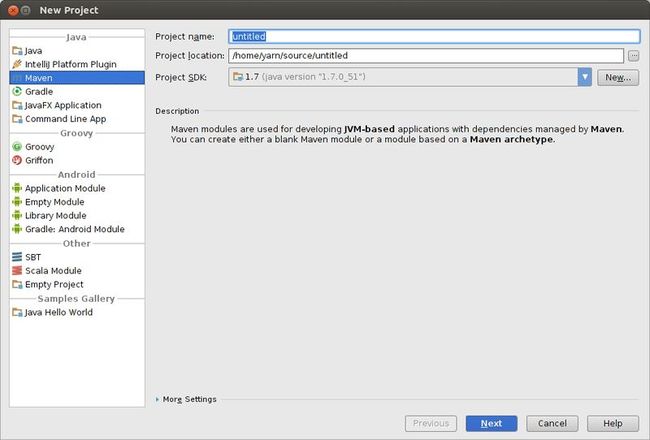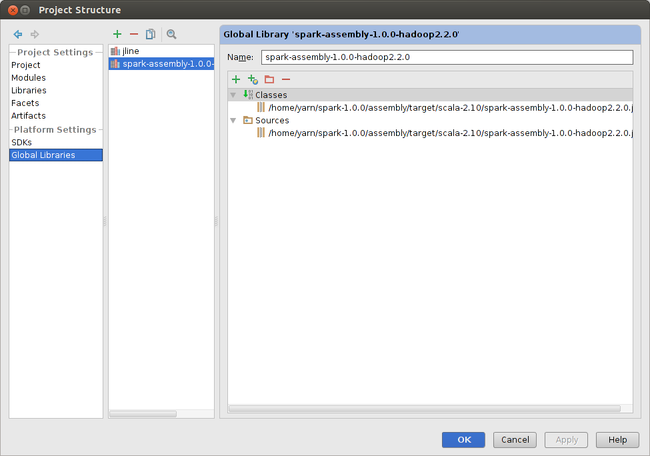Spark Pipe使用方法(外部程序调用方法)
写在前面:
1、我们使用的是Hadoop2.2.0,Spark 1.0。
2、这里使用的样例是经典的求pai程序来演示这个开发过程。
3、我们暂时使用java程序来开发,按照需要后面改用scala来开发。
4、我们使用的IDE是IntelliJ IDEA,采用maven来做项目管理。
一、项目创建
1.1 运行IDE,通过下面命令 ~/idea-IC-133.696/idea.sh
1.2 创建一个maven项目。
1.2 新建的项目添加库文件。
1) scala中lib的安装路径,如我们的路径在/usr/share/scala/lib
2) spark的lib文件,比如我们的文件在~/spark-1.0.0/assembly/target/scala-2.10/spark-assembly-1.0.0-hadoop2.2.0.jar
我们需要在IDE中添加这两个库文件。
1)按ctrl+alt+shift+s快捷键,选中global libraries,出现如下窗口,把上面两个目录添加进去,最后如下。
二、代码编写
1 /* 2 * Licensed to the Apache Software Foundation (ASF) under one or more 3 * contributor license agreements. See the NOTICE file distributed with 4 * this work for additional information regarding copyright ownership. 5 * The ASF licenses this file to You under the Apache License, Version 2.0 6 * (the "License"); you may not use this file except in compliance with 7 * the License. You may obtain a copy of the License at 8 * 9 * http://www.apache.org/licenses/LICENSE-2.0 10 * 11 * Unless required by applicable law or agreed to in writing, software 12 * distributed under the License is distributed on an "AS IS" BASIS, 13 * WITHOUT WARRANTIES OR CONDITIONS OF ANY KIND, either express or implied. 14 * See the License for the specific language governing permissions and 15 * limitations under the License. 16 */ 17 import org.apache.spark.SparkConf; 18 import org.apache.spark.api.java.JavaRDD; 19 import org.apache.spark.api.java.JavaSparkContext; 20 import org.apache.spark.api.java.function.Function; 21 import org.apache.spark.api.java.function.Function2; 22 import org.apache.spark.util.FloatVector; 23 24 import java.util.ArrayList; 25 import java.util.List; 26 27 public final class GPUPi { 28 29 30 public static void main(String[] args) throws Exception { 31 SparkConf sparkConf = new SparkConf().setAppName("JavaSparkPi"); 32 JavaSparkContext jsc = new JavaSparkContext(sparkConf); 33 int slices = (args.length == 1) ? Integer.parseInt(args[0]) : 2; 34 int n = slices; 35 int t = 100000000; 36 List<Integer> l = new ArrayList<Integer>(n); 37 for (int i = 0; i < n; i++) { 38 l.add(t); 39 } 40 String s = "./pi " + new Integer(n / slices).toString(); 41 int count = jsc.parallelize(l, slices) 42 .pipe(s) 43 .map( 44 new Function<String, Integer>() { 45 @Override 46 public Integer call(String line) { 47 return Integer.parseInt(line); 48 } 49 } 50 ).reduce(new Function2<Integer, Integer, Integer>() { 51 @Override 52 public Integer call(Integer integer, Integer integer2) { 53 return integer + integer2; 54 } 55 }); 56 System.out.println("Pi is roughly " + 4.0 * count / n / t); 57 } 58 }
这段代码通过RDDPipe,调用一个外部程序来计算,最后通过reduce+操作,获得几个外部程序的计算结果,这样一个接口,可以使得外部程序完全独立,和spark不会有太大的关系,甚至可以在外部程序中使用cuda等来加速。
这里需要说明一下pipe接口,这是因为在spark1.0中,我们依然没有在example样例中看到演示这个接口的任何代码。pipe接受一个cmd指令,然后在外部执行它,如“./pi"就是执行一个叫pi的可执行文件,所不同的是,这个外部程序所有的输入流都是由spark中的RDD传送给他的,同时,外部程序的输出,会形成一个新的RDD。
我们对应的c语言代码如下:
#include <stdio.h> #include <stdlib.h> #include <time.h> int main(int argc, char *argv[]) { int num = 0, count = 0,t; double z = RAND_MAX; z = z * z; t = atoi(argv[1]); for(int i = 0; i < t; i++){ scanf("%d",&num); for(int j = 0; j < num; j++){ double x = rand(); double y = rand(); if(x * x + y * y <= z){ count++; } } } printf("%d\n",count); return 0; }
三、编译
由于项目已经采用maven来管理了,这里也就使用maven来打包了。命令是mvn package,这样就会在target目录下生成gpu-1.0-SNAPSHOT.jar文件。
四、作业提交。
mvn package spark-submit \ --class GPUPi \ --master yarn-cluster \ --executor-memory 2G \ --num-executors 4 \ --files /home/yarn/cuda-workspace/pi/Release/pi \ target/gpu-1.0-SNAPSHOT.jar 4
--files把可执行文件pi发送到每一台机器上面。
--master指定执行的模式,一般都是选yarn-cluster模式,让spark跑在yarn上面,其他可以参考文档说明。

